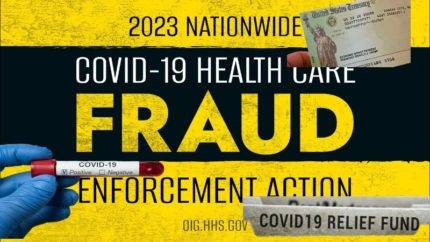In a stolen Covid-19 relief fund case, a federal jury in Boise, Idaho, delivered a conviction against Khadijah X. Chapman, a 59-year-old resident of Atlanta, Georgia, for her involvement in a fraudulent scheme related to the Paycheck Protection Program (PPP). The trial, which unfolded over the past week, revealed that Chapman collaborated with co-conspirators to fabricate financial information and submit multiple fraudulent loan applications to financial institutions in Boise and beyond, exploiting the relief measures provided under the Coronavirus Aid, Relief, and Economic Security (CARES) Act.
According to court documents and the evidence presented during the trial, Chapman successfully obtained $338,958 from a financial institution in Boise by submitting falsified information. Moreover, she continued her illicit activities by attempting to secure additional funding through fraudulent applications submitted to the Small Business Administration (SBA) and various financial institutions across the country. The funds, intended for supporting struggling businesses during the pandemic, were instead misappropriated for personal use, including purchasing jewelry and settling credit card bills for herself and her family.
Charges and Implications
The federal jury convicted Chapman on charges of bank fraud, underscoring the severity of her actions and the potential consequences for others involved in similar fraudulent activities. The verdict, reached after a thorough examination of the evidence, highlights the commitment of the justice system to hold individuals accountable for exploiting government relief programs meant to aid those affected by the economic impact of the COVID-19 pandemic.
Chapman now faces a maximum penalty of 30 years in prison, with her sentencing scheduled for February 6, 2024. The determination of her sentence will be made by a federal district court judge, taking into account the U.S. Sentencing Guidelines and other relevant statutory factors. This conviction serves as a stern warning to those contemplating fraudulent schemes to manipulate relief funds, emphasizing the legal consequences that await individuals engaged in such activities.

Co-conspirators Plead Guilty
This case is not isolated, as earlier this year, two other individuals, Daniel Labrum and Eric O’Neil, pleaded guilty in connection to a similar COVID-19 fraud ring operating alongside Chapman. Both Labrum and O’Neil entered their guilty pleas before a federal district judge in Boise and are awaiting sentencing later this year. These developments further highlight the collaborative effort by law enforcement to dismantle fraudulent networks seeking to exploit pandemic-related relief initiatives.
Ongoing Fight Against Covid-19 PPP-Related Fraud
The conviction of Khadijah X. Chapman underscores the ongoing efforts by federal authorities to combat fraud related to pandemic relief programs. As the government continues to provide financial support to businesses affected by the pandemic, it remains vigilant in identifying and prosecuting individuals who seek to undermine the integrity of these crucial initiatives.
The case serves as a stark reminder that those who engage in fraudulent activities will be held accountable, contributing to the deterrence of such schemes in the future. The legal proceedings against Chapman, Labrum, and O’Neil collectively reinforce the commitment to maintaining the integrity of relief efforts and ensuring that funds reach those genuinely in need during these challenging times.
A Continuous Trend: Bloomington Woman Also Sentenced in August
Continuing the trend of criminal prosecutions related to COVID-19 relief fund fraud, a Bloomington woman, Tequisha Solomon, aged 40, received a 7.5-year prison sentence in August 2023 for orchestrating a sophisticated scheme that pilfered millions of dollars in pandemic relief funds. Solomon had previously pleaded guilty to one count of wire fraud in December. According to court documents, she meticulously applied for over $7.1 million in pandemic-related funds. Between June 2020 and January 2022, Solomon’s actions led to U.S. and state agencies disbursing at least $4.7 million in the form of fraudulent unemployment benefits and small business loans.
The case exemplifies the significant lengths to which some individuals went to exploit pandemic relief measures, emphasizing the need for robust legal measures to deter and penalize those engaging in such criminal activities. Solomon’s sentencing serves as a stark reminder that law enforcement agencies are actively pursuing those involved in defrauding COVID-19 relief programs.
In October, Massive Covid-19 PPP Fraud Ring Leader Sentenced
In a separate but related development, the mastermind behind one of the largest Paycheck Protection Program (PPP) fraud cases, Amir Aqeel, 54, of Houston, was sentenced to 15 years in prison in October 2023. The sentencing also included an order for Aqeel to forfeit $5,583,111.48. Aqeel led a multimillion-dollar COVID-19 relief fraud ring that involved at least 14 other individuals. The group fraudulently obtained over $20 million in forgivable PPP loans guaranteed by the Small Business Administration (SBA) under the Coronavirus Aid, Relief, and Economic Security (CARES) Act.
Court documents revealed that Aqeel and his co-conspirators submitted 75 fraudulent PPP loan applications in 2020. The applications contained falsified information regarding the number of employees and average monthly payroll expenses of the applicant businesses. Additionally, the group submitted fake federal tax forms and fraudulent bank records to support their loan applications. Aqeel incentivized his accomplices with large kickbacks in exchange for their assistance in crafting and submitting the false and fraudulent PPP loan applications.
Significance of Prosecutions in Deterring Future Fraud
These recent convictions underscore the Justice Department’s commitment to holding individuals accountable for exploiting COVID-19 relief programs. The severity of the sentences, such as Solomon’s 7.5 years and Aqeel’s 15 years in prison, sends a strong message to potential fraudsters that engaging in schemes to defraud pandemic relief funds will result in severe legal consequences.
With the Justice Department actively prosecuting large-scale fraud rings, these cases contribute to the broader effort to maintain the integrity of relief initiatives and ensure that funds reach those truly in need during these challenging times. The legal system’s proactive stance against COVID-19 relief fund fraud is crucial in deterring future criminal activities and safeguarding the resources intended for businesses and individuals affected by the pandemic.














